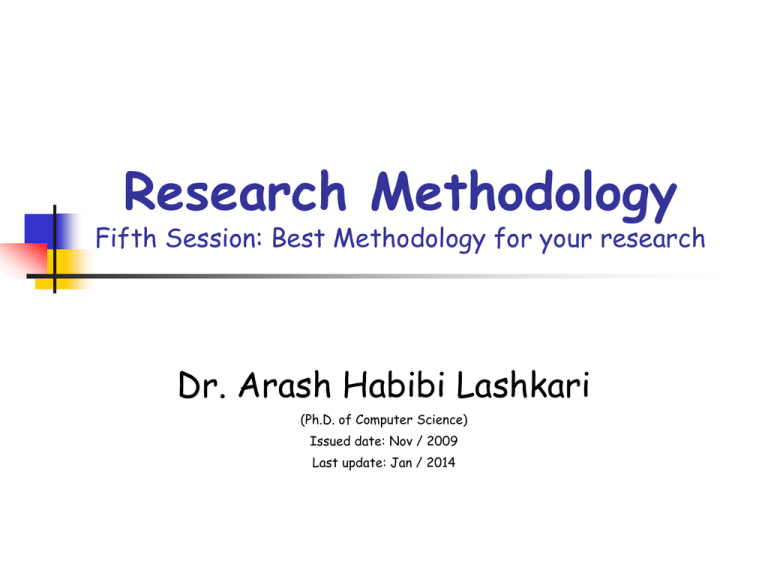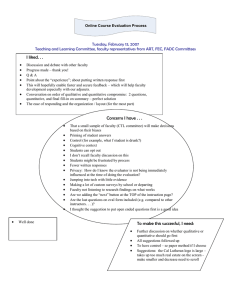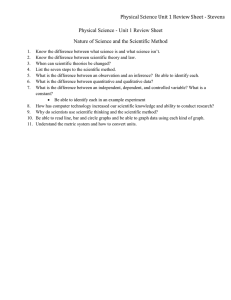RMWS_Session-05.pptx
advertisement

Research Methodology Fifth Session: Best Methodology for your research Dr. Arash Habibi Lashkari (Ph.D. of Computer Science) Issued date: Nov / 2009 Last update: Jan / 2014 Outlines: Types of Research Methods Types of Quantitative Types of Qualitative Others www.ahlashkari.com Types of Research Methods www.ahlashkari.com Types of RM Quantitative Qualitative Mixed (qualitative and quantitative) Critical and action oriented Quantitative vs Qualitative Quantitative research–is used to answer questions about relationships among measured variables with the purpose of explaining, predicting, and controlling phenomena. This approach is sometimes called the traditional, experimental, or positivist approach Qualitative research–is used to answer questions about the complex nature of phenomena, often with the purpose of describing and understanding the phenomena from the participants’ point of view. This approach is also referred to as the interpretative, constructivist, or post positivist approach Quantitative… Quantitative researchers usually start with a specific hypothesis to be tested, isolate the variables they want to study, control for extraneous variables, use a standardized procedure to collect some form of numerical data, and use statistical procedures to analyse and draw conclusions from the data Qualitative Qualitative researchers often start with general research questions rather than specific hypotheses, collect an extensive amount of verbal data from a small number of participants, organize those data into some form that gives them coherence, and use verbal descriptions to portray the situation they have studied Qualitative A quantitative study usually ends with confirmation or disconfirmation of the hypotheses that were tested •A qualitative study is more likely to end with tentative answers or hypotheses about what was observed. These tentative hypotheses may form the basis of future studies (perhaps quantitative in nature) designed to test the proposed hypotheses •In this way, qualitative and quantitative approaches represent complementary components of the research process – appropriate for answering different kinds of questions •As a result, we learn more about the world when we have both quantitative and qualitative methodologies Quantitative vs Qualitative Question Quantitative Qualitative What is the purpose of the research? To explain and predict To confirm and validate To test theory To describe and explain To explore and interpret To build theory What is the nature of the research process? Focused Known variables Established guidelines Predetermined methods Somewhat context-free Detached view Holistic Unknown variables Flexible guidelines Emergent methods Context-bound Personal view Quantitative vs Qualitative Question Quantitative Qualitative What are the data like, and how are they collected? Numeric data Representative, large sample Standardized instruments Textual and/or image-based data Informative, small sample Loosely structured or nonstandardised observations and interviews Statistical analysis Stress on objectivity Deductive reasoning Search for themes and categories Acknowledgment that analysis is subjective and potentially biased Inductive reasoning How are data analysed to determine their meaning? How are the findings communicated? Numbers Statistics, aggregated data Formal voice, scientific style Words Narratives, individual quotes Personal voice, literary style Other Research Methods Action Research Case and Field Study Research Correlation Research Developmental Research Methodology: Quantitative, Qualitative, Mixed Action Research, Case and Field Study Research Correlation Research, Developmental Research Next Session : Step 6: Find Your “Ping” www.ahlashkari.com “There is no way to get experience except through experience.” www.ahlashkari.com



